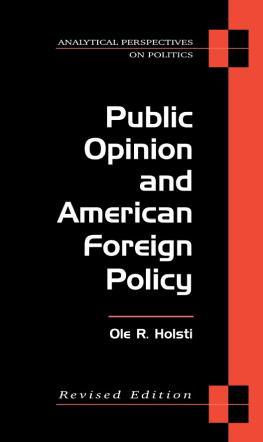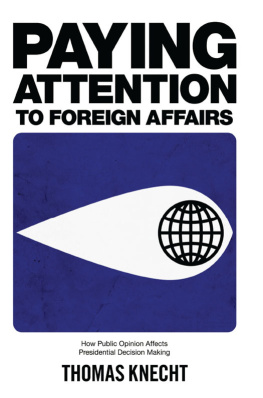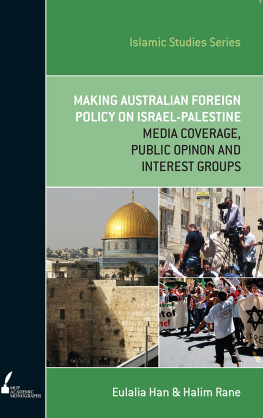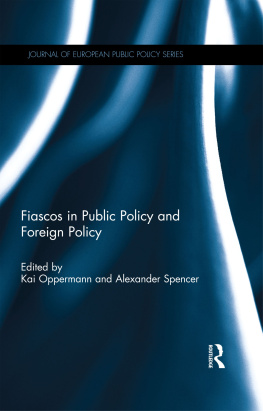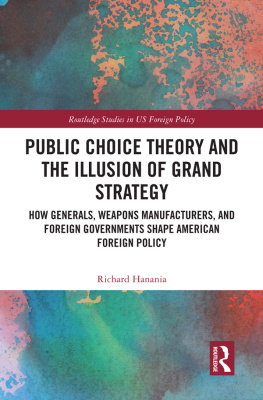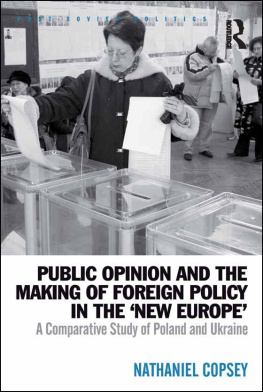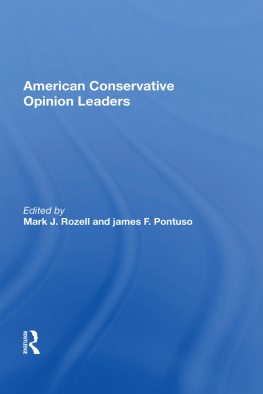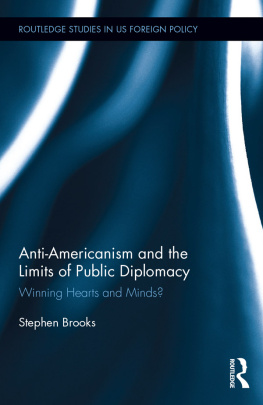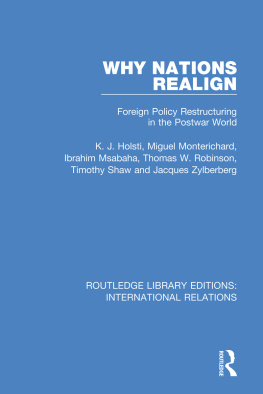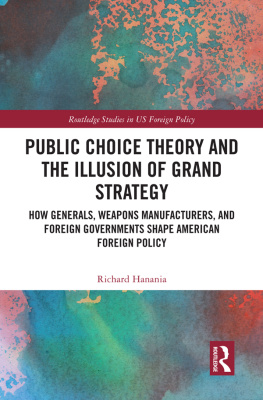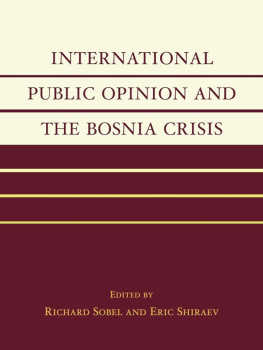Holsti - Public Opinion and American Foreign Policy
Here you can read online Holsti - Public Opinion and American Foreign Policy full text of the book (entire story) in english for free. Download pdf and epub, get meaning, cover and reviews about this ebook. year: 2004, publisher: University of Michigan Press, genre: Politics. Description of the work, (preface) as well as reviews are available. Best literature library LitArk.com created for fans of good reading and offers a wide selection of genres:
Romance novel
Science fiction
Adventure
Detective
Science
History
Home and family
Prose
Art
Politics
Computer
Non-fiction
Religion
Business
Children
Humor
Choose a favorite category and find really read worthwhile books. Enjoy immersion in the world of imagination, feel the emotions of the characters or learn something new for yourself, make an fascinating discovery.
Public Opinion and American Foreign Policy: summary, description and annotation
We offer to read an annotation, description, summary or preface (depends on what the author of the book "Public Opinion and American Foreign Policy" wrote himself). If you haven't found the necessary information about the book — write in the comments, we will try to find it.
Holsti: author's other books
Who wrote Public Opinion and American Foreign Policy? Find out the surname, the name of the author of the book and a list of all author's works by series.
Public Opinion and American Foreign Policy — read online for free the complete book (whole text) full work
Below is the text of the book, divided by pages. System saving the place of the last page read, allows you to conveniently read the book "Public Opinion and American Foreign Policy" online for free, without having to search again every time where you left off. Put a bookmark, and you can go to the page where you finished reading at any time.
Font size:
Interval:
Bookmark:
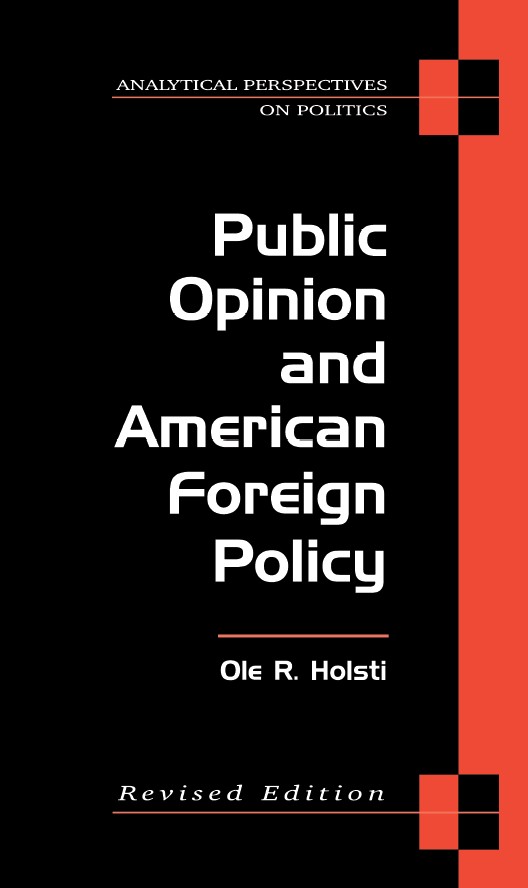
Public Opinion and American Foreign Policy
Analytical Perspectives on Politics
ADVISORY EDITORS:
John Aldrich, Duke University
Bruce Bueno de Mesquita, Hoover Institution and New York University
Robert Jackman, University of California, Davis
David Rohde, Michigan State University
Political Science is developing rapidly and changing markedly. Keeping in touch with new ideas across the discipline is a challenge for political scientists and for their students.
To help meet this challenge, the series Analytical Perspectives on Politics presents creative and sophisticated syntheses of major areas of research in the fields of political science. In each book, a high-caliber author provides a clear and discriminating description of the current state of the art and a strong-minded prescription and structure for future work in the field.
These distinctive books provide a compact review for political scientists, a helpful introduction for graduate students, and central reading for advanced undergraduate courses.
Robert W. Jackman, Power without Force: The Political Capacity of Nation-States
Linda L. Fowler, Candidates, Congress, and the American Dernocracy
Scott Gates and Brian D. Humes, Games, Information, and Politics: Applying Game Theoretic Models to Political Science
Lawrence Baum, The Puzzle of Judicial Behavior
Barbara Geddes, Paradigms and Sand Castles: Theory Building and Research Design in Comparative Politics
Rose McDermott, Political Psychology in International Relations
Ole R. Holsti, Public Opinion and American Foreign Policy, Revised Edition
Copyright by the University of Michigan 2004
All rights reserved
Published in the United States of America by
The University of Michigan Press
Manufactured in the United States of America Printed on acid-free paper
Printed on acid-free paper
2007 2006 2005 2004 4 3 2 1
No part of this publication may be reproduced, stored in a retrieval system, or transmitted in any form or by any means, electronic, mechanical, or otherwise, without the written permission of the publisher.
A CIP catalog record for this book is available from the British Library.
Library of Congress Cataloging-in-Publication Data
Holsti, Ole R.
Public opinion and American foreign policy /
Ole R. Holsti.Rev. ed.
p. cm.(Analytical perspectives on politics)
Includes bibliographical references and index.
ISBN 0-472-03011-6 (pbk. : acid-free paper)
I. United StatesForeign relations1989Public opinion.
2. United StatesForeign relations19451989Public opinion.
3. Public opinionUnited States. I. Title. II. Series.
E840.H592 2004
32773dc22 2004000622
ISBN13 978-0-472-03011-8 (paperback)
ISBN13 978-0-472-02230-4 (electronic)
For Maija, Brad, and Aksel
Bethany, Carrie, Charlie, Damon, and Dara
Erin, Kate, Kelly, Rene, and Sarah
The first edition of Public Opinion and American Foreign Policy was generally well received, but that is not sufficient reason to bring out a revised and updated version of the book. The rationale for a new edition can be found in a number of developments since 1995, when the first edition went to press. In addition to important evidence about public attitudes provided by the Gallup Organization and other major polling firms, the Chicago Council on Foreign Relations, the Program on International Policy Attitudes, the Pew Research Center for the People and the Press, the Foreign Policy Leadership Project, and the Triangle Institute for Security Studies have undertaken major surveys that focus on various important aspects of America's foreign relations. These have been especially helpful because each of them has included samples of opinion leaders, a sector of American society that has not frequently been the subject of special attention from Gallup and other commercial polling firms. Almost all of the tables appearing in the first edition have been redone to reflect new evidence from these surveys.
A second important development has been the recent publication of major studies that have probed the most difficult and complex issue regarding public opinionits impact on the political process. Steven Kull, I. M. Destler, Lawrence Jacobs, Robert Shapiro, Richard Sobel, Douglas Foyle, and others have been at the forefront of efforts to combine archival research with interviews of public officials and in some cases of pollsters, thereby providing a better understanding of how public opinion enters the policy-making process, the uses to which it is put, and its impact on policy outcomes. These works and other works have provided important new evidence for the discussions in and elsewhere.
The end of the Cold War and increasing democratization areamong the developments that have opened up opportunities for public opinion studies in countries where such research, especially by Westerners, would have been quite unthinkable even a few years ago. This book focuses on the United States, but the growth of comparative cross-national research provides a much richer understanding of the relationship between public opinion and foreign policy-for example, which findings about that relationship are limited to the American political context, and which may have more universal validity?
A major theme of the first edition of this book is that research and theory on public opinion and foreign policy have often been shaped by such key events as the two world wars of the twentieth century and the war in Vietnam. Several studies have shown that many post-Vietnam aspects of public attitudes have persisted beyond the end of the Cold War. However, the enormity of the September 11, 2001, terrorist attacks on New York and Washington raises anew questions about continuity and change. As many analysts have asserted, has everything changed since 9/1 I, including public attitudes toward foreign affairs, much in the way that the attack on Pearl Harbor six decades earlier drove a stake through the heart of the isolationist argument that national interests, geographical realities, and commonsense prudence dictated a policy of limiting contacts with belligerents or potential belligerents abroad? It is clearly far too early to assess the long-term impact of 9/11 on the American public and its attitudes toward global engagement. , which is wholly new in this edition, nevertheless undertakes at least an interim assessment of the role, if any, that public opinion has played in promoting or sustaining the Bush administration's pronounced preferences, during both the nine months before September 11 and the first two years following the terrorist attacks, for a unilateralist approach to world affairs. The 9/11 period includes debates and frequent polling on the issue of Iraq, culminating in the March 2003 invasion of that country and the destruction of Saddam Hussein's regime in Baghdad.
In this undertaking I have been extraordinarily fortunate in receiving the counsel, insights, assistance, and encouragement of many persons. I reiterate the many debts acknowledged in the preface to the first edition. Many of those cited there have continued to provide help far beyond the call of collegiality and friendship, and my gratitude for their assistance persists unabated. I have also benefitted immensely from those who pointed and provided incisive and useful suggestions for improving it. I am also indebted to two anonymous reviewers who read the entire manuscript and offered their suggestions for revisions. Steve Kull was generous in offering advice and sharing data from his Program on International Policy Attitudes; Chris Whitney was most helpful in providing data from the 2002 Chicago Council on Foreign Relations survey; and Steve Casey provided some useful information about Franklin Roosevelt's views on polling.
Font size:
Interval:
Bookmark:
Similar books «Public Opinion and American Foreign Policy»
Look at similar books to Public Opinion and American Foreign Policy. We have selected literature similar in name and meaning in the hope of providing readers with more options to find new, interesting, not yet read works.
Discussion, reviews of the book Public Opinion and American Foreign Policy and just readers' own opinions. Leave your comments, write what you think about the work, its meaning or the main characters. Specify what exactly you liked and what you didn't like, and why you think so.

